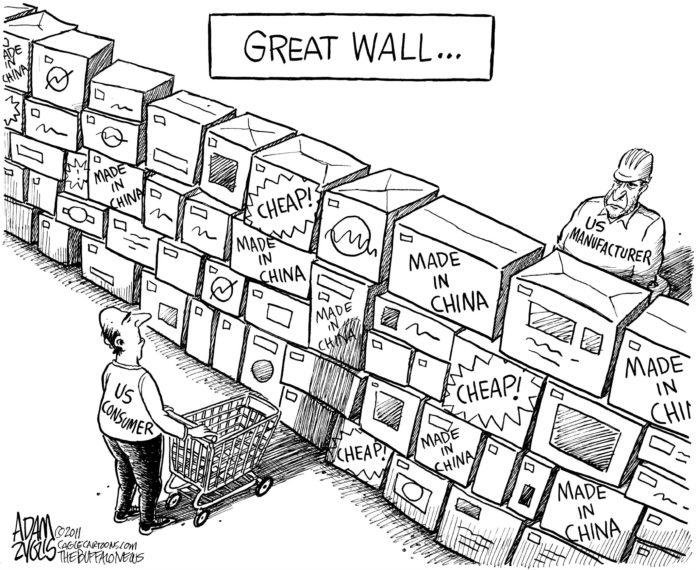BY RALPH NADER
“Here, look at this handsome L.L. Bean catalog and tell me what you want for Christmas,” said a relative over Thanksgiving weekend. I started leafing through the 88-page cornucopia with hundreds of clothing and household products, garnished by free gift cards and guaranteed free shipping. I wasn’t perusing it for any suggested gifts; instead, I was going through every offering to see whether they were made in the USA or in other countries.
This is what I found: over 97% of all the items pictured and priced were noted “imported” by L.L. Bean. The only ones manufactured in the U.S. were fireplace gloves, an L.L. Bean jean belt, a dress chino belt, quilted faux-shearling-lined L.L. Bean boots [made in Maine], a personalized web collar and leash [for your pet], and symbolically enough, the “made in Maine using American-made cotton canvas are the Original Boat and Tote Bags” to carry all those goodies coming in from China and elsewhere.
That was it for the products that were “Made in America.” The former fountainhead of global manufacturing has been largely deflated by the flight of U.S. companies to fascist or communist regimes noted for holding down their repressed workers.
But there is much more to this story and the plight of millions of American workers and hundreds of their hollowed out communities that are the visible results of corporate free trade propaganda.
How many times have the politicians and their corporate paymasters told us that “free trade” with other nations is a “win-win” proposition? They win and we win. After all, isn’t that what happened 200 years ago when Portugal sold its wine to England in return for British textiles? Economists have won many prizes elaborating this theory of comparative advantage.
That is what Nobel laureate super-economist Paul Samuelson believed in the many years he wrote and updated his standard “Economics 101” textbook studied by millions of college students for nearly 50 years. For many of his colleagues, the theory of “free trade” had become an ideology bordering on a secular religion. Don’t bother them with the facts.
Some of their students became reporters, such as Thomas Friedman of The New York Times, taking this prejudgment of reality into their uncritical coverage of the very flawed NAFTA and World Trade Organization agreements under President Clinton in the 1990s.
But Samuelson increasingly became an empiricist, along with his academic contributions in mathematical economics. Before one of his book revisions in the ’70s, he wrote me asking for whatever materials I thought would be useful regarding consumer protection and consumer fraud. He presaged the relatively new field of behavioral economics and their obvious findings that consumers do not always maximize their best interests, and can act “irrationally” in a fast-paced marketplace of clever or unscrupulous sellers.
Gradually, Professor Sameulson saw trade between nations move from “comparative advantage” to more and more “absolute advantage.” That is, companies were using the swift mobility of capital, modern factory machinery and transport to locate all elements of production – labor, capital, raw materials, and advanced know-how in one place – now most notably in China.
Absolute advantages have been aided by the corporate-managed trade agreements of WTO and NAFTA. These treaties are also conveniently violated to facilitate large subsidies that are not supposed to be used to lure companies to move. This trade in giveaways has China winning over the U.S., most recently in pulling American solar factories to China.
If corporate “free trade” is a win-win proposition, adhered to by one president after another, including Barack Obama, how come our country has piled up bigger trade deficits every year since 1976? Big is really big.
Over the past decade our country has bought from abroad more than it has sold an average of well over half a trillion dollars each year.
In 1980 the U.S. was the world leading creditor – they owed us – while now, the U.S. is by far the world’s leading debtor – we owe them!
At what point do the “free traders” cry “uncle” and rethink their commercial catechism? So long as multinational corporations control our politicians, it will not happen. For these companies are looking for the most worker-controlled, environmentally-pollutable and bribable countries to locate their manufacturing bases. Global companies are just that, bereft of any allegiance or grateful patriotism to their country of birth, profit and bailout salvation.
Here are three questions you may wish to ask any self-styled “free traders”:
What amount of evidence do you require to get rid of your dogma and, as a minimum, start thinking like Paul Samuelson?
How much of the savings from lower costs abroad are going for large profits and not being passed on to the consumer who also has to endure the reported hazards of unregulated imports?
And at what point do you look at L.L. Bean-type catalogs and ask whether you are getting a price break that is worth the debilitating dependency on other nations that use exploitation, repression, violations and outright counterfeiting as unfair methods of competition against our stateside companies and workers?
– Ralph Nader’s columns appear regularly in The Oklahoma Observer
nader.org








